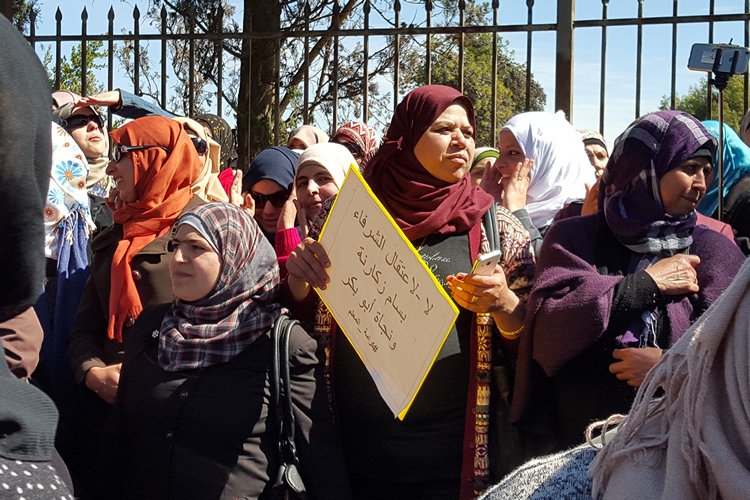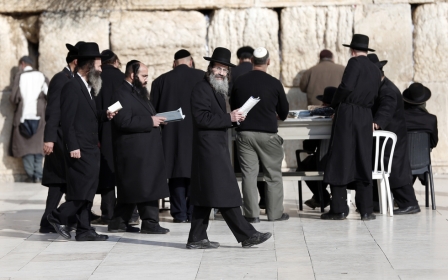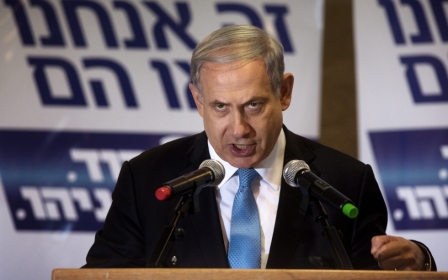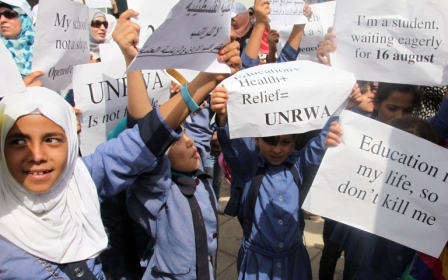West Bank teachers harden stance as strike enters fourth week

Thousands of Palestinian teachers and their supporters have protested in front of the prime minister's office in Ramallah in the latest demonstration in a strike now lasting more than three weeks.
Protesters and local media estimate that 35,000 teachers are currently on strike, affecting around 700,000 children in the West Bank. Ma’an, a Palestinian news agency, said that at least 3,000 teachers joined the protest on Tuesday.
The list of demands is long: teachers want an agreement that was signed in 2013 between the Palestinian Teachers’ Union and the Palestinian Authority to be respected. This agreement mostly dealt with salary raises.
Teachers say they are paid significantly less than other public sector workers, and claim that they don’t benefit from similar promotion structures.
Teachers also want independent representation, arguing that the teachers’ union should not be part of the Palestine Liberation Organisation (PLO). Some teachers also say the union's chair, Ahmed Suhweil, is too close to the political party Fatah.
Over the past two weeks, the government has agreed to progressively implement the 2013 agreement if the strike is ended. Teachers refused, insisting that their demands for a new union be accepted.
New representatives have already been elected in each district, but the government has not recognised them as a legal union.
Last night the Legislative Council, acting as a mediator, asked for a demands committee to be formed, so that the parties can begin negotiating the teachers' demands.
The Ministry of Education also offered to pay part of the salary rises due since 2013 in the upcoming week; plus further increases through to September.
In addition, the ministry added that the other demands would be negotiated by the same deadline, but only if the strike stopped immediately.
Palestinian Prime Minister Rami Hamdallah asked the teachers to be “responsible”, to realise the school year is almost over and that children need to go back to class.
But teachers rejected all the proposals and stressed that they have no guarantee the prime minister and the Ministry of Education would actually keep their word, as the government also repeatedly said that their financial situation had prevented them from meeting teachers' demands.
In a statement released on Tuesday, Hamdallah reaffirmed “his commitment to Palestinian teachers, students and their parents to work on finding an equitable solution to end the teachers' strike”, but also asked teachers to return to work in the students’ best interests.
Parents and students also took part in Tuesday's protest.
“I support the teachers’ strike because it’s about education which is our country’s future,” Saji Isam, 17, told Middle East Eye. Students in their senior year are most affected by the strike: “We are worried because our results from the final exams decide which university we go to, so it really is about our future, not only politics,” he added.
During the first weeks of the movement 20 teachers were arrested and others reported being intimidated for having joined protests. The strike has been one of the biggest opposition movements to the PA in recent years – with more than 20,000 people taking part in the strike during the past month.
New MEE newsletter: Jerusalem Dispatch
Sign up to get the latest insights and analysis on Israel-Palestine, alongside Turkey Unpacked and other MEE newsletters
Middle East Eye delivers independent and unrivalled coverage and analysis of the Middle East, North Africa and beyond. To learn more about republishing this content and the associated fees, please fill out this form. More about MEE can be found here.




